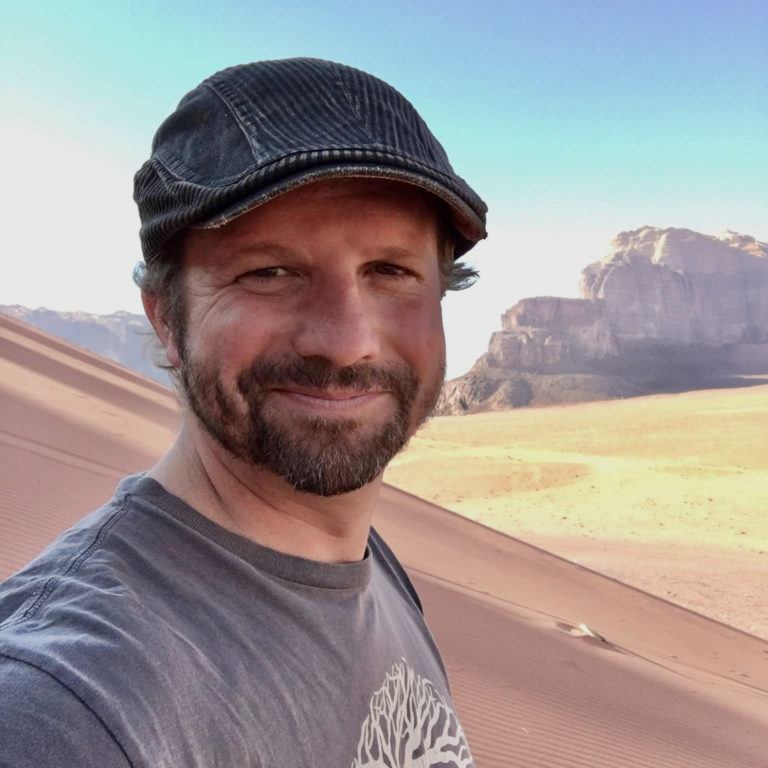Friends, meet Sami. His story might seem radical or totally foreign to most, but look a little deeper. Sami’s story is universal, and it’s a river crossing every one of us must make.
“I grew up in Jordan surrounded by many Palestinians. At school and church I was the only non-Arab, and I was very comfortable. I didn’t think of myself as really being from the USA. That felt like my parents’ country.”
Sami settled into into his armchair and continued, “Back then, Jordan was more than half Palestinian. Imagine a country’s population being over 50% displaced refugees. Imagine the yearning for home and the pain. That was what I grew up in, and I absorbed those Palestinian stories.”
“So when I started college at an evangelical university in the U.S., I felt so disconnected from the kind of Christianity I encountered there. It became evident to me that this form of Christianity was only actually relevant to certain people—particularly white, wealthy, conservative people. I left that school after a few years frustrated and disillusioned.”
Sami returned to the Middle East to study local politics and history in Egypt. He thought he was returning to something more familiar, his Middle Eastern home, but he didn’t expect the disruption that came next:
“One course focused on the Arab-Israeli conflict. Now, at that time my entire knowledge of the situation was from the Palestinian side, but that course required us to jump back and forth between the two sides. In other words, we spent time crossing the divide.”
“The most humanizing experience for me was having a shabbat dinner with a young Israeli couple. Growing up, Israelis were the enemy. I had Palestinian friends who had lost family members, their lives ruined. But while having that shabbat dinner with an Israeli couple, I remember thinking, ‘I really like this couple.’ They were fun, thoughtful, compassionate people who cared deeply for others—I could be friends with them.”
“Yet I also knew they were a part of a system within a country that was responsible for a whole lot of pain and injustice, much of which they didn’t seem to understand. They didn’t know the other side, the Palestinian side.
It was troubling and also fascinating to me that this kind, educated, justice-oriented Israeli couple could be so completely uninformed of elements of their national history and the pain that their country was causing so many people.”
For possibly the first time, Sami saw both sides.
“I began to see the difference between people and systems and how people are part of harmful systems, often without knowing it. I began to see my own responsibility as a U.S. citizen, and I discovered an opportunity to join others in pursuing peace.”
Today, Sami and his family live along the US-Mexico border where they invite people to see both sides of a complicated immigration reality. They ask us to consider our own role in these systems of power we uphold. They invite us to empathize with the border patroller and his family, then they introduce them to someone seeking asylum in the U.S., often a young migrant mother with her children. They welcome people into these disruptive ‘border crossings’ with the firm belief in their power to move hearts toward justice and healing—they even named their organization Abara, meaning ‘river crossing’!
Something powerful happened in Sami when he empathized with that young Israeli couple. It was a border crossing of sorts that transformed him. Today, his life’s work as an Everyday Peacemaker is to offer these same kinds of transformative ‘border crossings’ to others.
Author: Matt Willingham
 Matt Willingham is a writer, photographer, and content creator with over ten years experience living and working in some of the hardest-hit conflict zones in the world. He and his wife, Cayla, are now based in San Diego where they’re raising three little peacemakers and working to promote empathy and understanding in their community.
Matt Willingham is a writer, photographer, and content creator with over ten years experience living and working in some of the hardest-hit conflict zones in the world. He and his wife, Cayla, are now based in San Diego where they’re raising three little peacemakers and working to promote empathy and understanding in their community.
@matt.willingham

